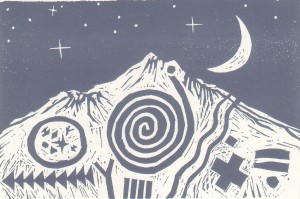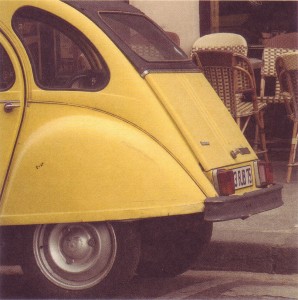Is It Pressure or Is It Stress?
 I listened to a delightful talk yesterday by Sally Armstrong, called Mindful Happiness. She refers to lots of studies, including recent scientific research that shows changes in blood chemistry after extended periods of meditation, but what comes to mind most clearly this morning, as I think about what I want to post, is an article she quotes by Phillip Moffitt, in which he distinguishes between pressure and stress. Here’s what he says:
I listened to a delightful talk yesterday by Sally Armstrong, called Mindful Happiness. She refers to lots of studies, including recent scientific research that shows changes in blood chemistry after extended periods of meditation, but what comes to mind most clearly this morning, as I think about what I want to post, is an article she quotes by Phillip Moffitt, in which he distinguishes between pressure and stress. Here’s what he says:
“Pressure is a natural response to the ‘weight’ or ‘heaviness’ of the demands in your life, which you experience in your body, particularly your nervous system… Pressure is like an internal messenger that is telling you, ‘Pay attention.’ You experience this message as a demand; it is this demand that constitutes the felt sense of pressure in your body and mind.
“Stress is a very different phenomenon. It is your mind’s fearful, anxious, and immediate reaction to the demands that you face. You may be reacting to demands that you are facing at this moment or ones that you anticipate will happen in the future. You may even be reacting to pressure you felt in the past that was so traumatizing that the memory of it triggers feelings of stress in the present. You may also be inflating how truly fearful the situation is or completely misperceiving what’s going on.”
***
So, for example, pressure is what you feel when you’ve got a lot of stuff to do and not a lot of time to do it in. Stress is your response to that feeling of pressure. It’s the: I can’t do this! It’s not fair! Why does all this stuff always get dumped on me all the time!!!!!
***
Phillip goes on to say:
“The first step in overcoming this reflexive reaction is to ask yourself: ‘Is this really stressful or am I simply feeling a lot of pressure?’
“You find the answer by assessing the particulars of the situation, clarifying what action is called for (while being realistic about what you are capable of doing), and accepting that there are times in life when you will feel pressure and the outcome is uncertain…. If it truly is a stressful situation and you are in danger or unable to function, then you need to take whatever steps are necessary to assure your safety.
“The second step is to be mindful of whether you are feeling stressed simply because you are under pressure. If so, you can remedy this in several ways:
“Begin with naming it as pressure and clarifying what the demand is. Then define the tasks involved and make a list of what is required of you to complete what needs to be done.
“Acknowledge the challenge that the pressure presents and work out a system of balancing it. Allowing yourself time to rest, eating healthy food, meditation, being in nature, engaging in physical activity, receiving body work, and getting involved in activities that give you joy can all help bring relief from stress.
“Find a support system (either a person or a group, professional or friends) to help you deal with the pressure.”
***
There’s more. Click here to read the entire article, titled Preventing Pressure from Becoming Stress.
Tele-Book-Club-ing
 The Monday night Dharma Book Club met last night, and they put a laptop on one of the chairs in the circle so I could join them on Skype. It worked great!
The Monday night Dharma Book Club met last night, and they put a laptop on one of the chairs in the circle so I could join them on Skype. It worked great!
We’re discussing Mindfulness: A Practical Guide to Awakening by Joseph Goldstein and we spent quite a bit of time on this paragraph at the end of Chapter 5:
“As a meditation exercise, particularly in sitting, it is sometimes helpful to notice what aspect of impermanence is most predominant. Are we seeing new things arise even before the last one has ended? Are we seeing the endings more clearly and not seeing the moment of an object arising? Or do we see both the arising and passing away of objects equally? In the course of our practice, sometimes it is one way, sometimes another. Noticing how we perceive change is simply another way to refine our attention.”
So next time you’re sitting, check it out. What do you notice more — the sound of the air conditioner when it comes on, or when it stops? How about the gurgle in your stomach? The twinge in your knee? How about the urge to shift your weight? To look at the clock?
Asking yourself this question is helpful, not because there’s anything special about the beginning or ending of any of these things, but because this kind of investigation brings more awareness to what’s actually happening in the moment — as to opposed to what you assume is happening. It’s this more aware attention that we’re trying to develop. Because this is what will allow us to see things more clearly…with less of an “I know this already” attitude…which will allow us to respond to whatever is happening based on what’s actually happening instead of what we think is happening. Or not really knowing what’s happening at all, and just cruising along on autopilot!
Check it out.
Please Bring Strange Things
 I listened to another great talk last night, this one given by Greg Scharf, in which he offers this strange and beautiful poem as a blessing:
I listened to another great talk last night, this one given by Greg Scharf, in which he offers this strange and beautiful poem as a blessing:
Initiation Song from the Finders Lodge
by Ursal K. Le Guin
Please bring strange things.
Please come bringing new things.
Let very old things come into your hands.
Let what you do not know come into your eyes.
Let desert sand harden your feet.
Let the arches of your feet be the mountains.
Let the paths of your fingertips be your maps
and the ways you go be the lines on your palms.
Let there be deep snow in your in-breathing
and your outbreath be the shining of ice.
May your mouth contain the shapes of strange words.
May you smell food cooking you have not eaten.
May the spring of a foreign river be your navel.
May your soul be at home where there are no houses.
Walk carefully, well loved one.
Walk mindfully, well loved one.
Walk fearlessly, well loved one.
Return with us, return to us,
be always coming home.
***
(image from Stella’s Tarot)
“Wisdom” Yogurt
 Another offering from the Spirit Rock Cookbook, this one adapted from Insalata’s Mediterranean Table by Heidi Insalata Krahling:
Another offering from the Spirit Rock Cookbook, this one adapted from Insalata’s Mediterranean Table by Heidi Insalata Krahling:
Turkish “Wisdom” Yogurt
for fresh veggie dipping or drizzling over roast root veggies (especially acorn squash)
1/4 cup olive oil
1 tsp curry powder
1/2 tsp ground turmeric
1/4 tsp ground cinnamon
1 cup greek yogurt
salt to taste
1/4 tsp freshly cracked black pepper
1 clove garlic, minced
2 tsp chopped cilantro
In a small sauce pan, warm the oil, curry powder, turmeric, garlic and cinnamon over low heat, until the spices and garlic are fragrant. Do no allow to boil. Set aside to cool.
In a medium bowl, whisk the yogurt until smooth. Drizzle in the spice-infused oil, whisking until combined. Add the salt, paper and cilantro. Taste and adjust the seasonings. If the sauce seems too thick, whisk in 1 or 2 tablespoons of water until the consistency is to your liking. Store in an airtight container, refrigerated, for up to 1 week.
Enjoy!
For Dharma Geeks Only
 In one of the talks given to the new group of Dedicated Practitioners (DPP5), Tempel Smith mentions a new website that he has “fallen in love with,” so of course I had to check it out.
In one of the talks given to the new group of Dedicated Practitioners (DPP5), Tempel Smith mentions a new website that he has “fallen in love with,” so of course I had to check it out.
It’s called Buddha Vacana (which means Words of the Buddha) and basically it’s a way to get a fuller understanding of some of the key words and phrases from the Early Buddhist texts by using side-by-side comparison of the Pali and English translations. What’s really cool — I’m a Dharma Geek, what can I say — is that when you scroll over the Pali word, an info bubble pops up with all the different ways in which that particular word has been translated.
For example, in an excerpt from the Anapanassati Sutta, the well-known teaching about the practice of mindfulness of breathing, anapanassati is broken down into anapana (breath, respiration) + sati (awareness, attention, mindfulness)… and if you click on “for further details” under the word sati, you get:
“sati: the term has two meaning which, although apparently opposed are actually related:
“(1) awareness, attention, mindfulness, fact of being clearly conscious/vigilant. It is one of the seven bojjhangas, said to be the most important because the other six are to be developed along with it. The standard definition of samma-sati, given for example at SN 45.8, actually consists of the description of the four satipatthanas. Sati is one of the five spiritual indriyas and the five balas. Sati as one of the five balas is defined at AN 5.14.
“(2) memory, recollection. This aspect of sati is actually also covered by the definition given at AN 5.14. These two meanings are related in the sense that an awareness supported by the collectedness of concentration is a necessary condition to get proper perception and understanding of what is happening in the present moment, which enables an easy recollection at a later time of what precisely was happening, of what was said, what was done at a prior moment, even a long time before. In one case sati is defined as per what is happening in the present moment, and in the other as per the qualities that develop in the bhikkhu when he has been endowed with this awareness of the present moment for a long time.”
(Each of the italicized words above are hyperlinked to even more information!)
***
So, OK, the site is not for everyone. But for all you Dharma Geeks…this site is AWESOME.
Fancy.
 One more poem from Jack Kornfield’s talk (the one I posted about yesterday).
One more poem from Jack Kornfield’s talk (the one I posted about yesterday).
This World
by Mary Oliver
I would like to write a poem about the world that has in it
nothing fancy.
But it seems impossible.
Whatever the subject, the morning sun
glimmers it.
The tulip feels the heat and flaps its petals open and becomes a star.
The ants bore into the peony bud and there is a dark
pinprick well of sweetness.
As for the stones on the beach, forget it.
Each one could be set in gold.
So I tried with my eyes shut, but of course the birds
were singing.
And the aspen trees were shaking the sweetest music
out of their leaves.
And that was followed by, guess what, a momentous and
beautiful silence
as comes to all of us, in little earfuls, if we’re not too
hurried to hear it.
As for spiders, how the dew hangs in their webs
even if they say nothing, or seem to say nothing.
So fancy is the world, who knows, maybe they sing.
So fancy is the world, who knows, maybe the stars sing too,
and the ants, and the peonies, and the warm stones,
so happy to be where they are, on the beach, instead of being
locked up in gold.
Wonderful.
 I just listened to a wonderful talk by Jack Kornfield. I mean that literally — it is a talk full of wonder — in which he offers an “Invitation to Mystery”…. to that which the Victorians translated as Enlightenment, but which he prefers to call Awakening, or better yet, Seeing the World with a Sense of Wonder. You can listen to the talk by clicking here. (There’s a minute or so of silence near the beginning of the talk. Don’t worry. Just keep listening.)
I just listened to a wonderful talk by Jack Kornfield. I mean that literally — it is a talk full of wonder — in which he offers an “Invitation to Mystery”…. to that which the Victorians translated as Enlightenment, but which he prefers to call Awakening, or better yet, Seeing the World with a Sense of Wonder. You can listen to the talk by clicking here. (There’s a minute or so of silence near the beginning of the talk. Don’t worry. Just keep listening.)
Jack tells lots of wonderful stories in this talk, including stories about his time with Ajahn Chah and about his own Awakening experiences — the “breaking of the spell of ordinariness,” as he calls it. He also talks about his divorce and the new relationship he is in. And his past illness, which was quite serious, and not entirely gone. I couldn’t begin to do these stories justice by summarizing them here. You’ll just have to listen to the talk!
As further incentive I offer one of the poems he quotes (although he doesn’t mention the title.) It’s by Bridget Lowry:
In the strange, early evening half-light we sit.
In the cloudiness of our questioning, we sit.
In our madness and our clarity, we sit.
In the midst of too much to do, we sit.
In the warm arms of our shared sorrow, we sit.
In community and in loneliness, we sit.
In sweet exhaustion, we sit.
In the blazing energy of being alive, we sit.
Here with the singing coyotes and the crows,
With each electric bird song
And the rippling breeze and the dry grasses,
Here with the cobwebs and the moon
And the muddy and dusty road upon us…
Us in the sound,
And the sound in us.
Us in the world,
And the world in us.
How to Feel at Home
 I have arrived here at my brother’s house in Chapel Hill, where I will be staying for the summer while he and his family are in England. So, basically, this is home for me right now, but of course this is not my home, which got me thinking about what it really means to feel at home.
I have arrived here at my brother’s house in Chapel Hill, where I will be staying for the summer while he and his family are in England. So, basically, this is home for me right now, but of course this is not my home, which got me thinking about what it really means to feel at home.
It sort of means being where you’re comfortable. Which kind of means where your stuff is. Right? Or, at least, where you keep your stuff…when you’re not carrying it around with you.
Which got me thinking about George Carlin’s famous Stuff routine. Which is so funny because it’s so true.
Which got me thinking about how much stuff I’ve got. And then about something Ajahn Sucitto said in one of his talks, about how we can never really have anything because as soon as we get it, we don’t want it, because it’s not really the thing we want, it’s some idyllic state of satisfaction we project onto the thing (he calls it the “glow”), which is not in the thing itself, only in our perception of the thing.
So when we get the thing we want, we feel the momentary relief from the tension of wanting of it, but then right away we realize that what we have is just a thing — that the idyllic state of satisfaction we wanted, which we thought we’d get with the thing, isn’t there — so we didn’t really get what we wanted, and then we feel the lack of that, so we start to want something else.
Hmmm.
So what would it be like not to believe in the idyllic state of satisfaction we think will come with whatever it is that we currently don’t have, but want, and instead to just relax into the state of peace that’s already there when we’re not wanting it.
Maybe that’s what it really means to feel at home.
***
Click here to listen to Ajhan Sucitto’s talk about wanting and having.
On the Road Again
 I’m leaving tomorrow morning to drive to Chapel Hill, NC, where I’ll send the summer house-and-cat-sitting for my brother and his family who are taking a sabbatical in England. I’ve visited Chapel Hill quite often, but only for a week or so at a time — so going for the whole summer will be much more of an adventure.
I’m leaving tomorrow morning to drive to Chapel Hill, NC, where I’ll send the summer house-and-cat-sitting for my brother and his family who are taking a sabbatical in England. I’ve visited Chapel Hill quite often, but only for a week or so at a time — so going for the whole summer will be much more of an adventure.
I’m packing today and am trying to keep in mind my new intention to Simplify and Enjoy, but it’s a challenge. (For example, do I really need those hiking boots — there are woods near the house — or will my sneakers be enough?)
I’m not really sure what I’ll do in Chapel Hill, but I’ll definitely check out the Dharma scene, and I’ll continue to post, every weekday, like always. But it will take me a couple of days to drive there, and probably a day or so after that to get settled in, so don’t expect a posting until the end of the week, at the earliest. To tide you over, I offer this poem, which is not exactly a “dharma” poem, but I love it, so what the heck:
Night Drive
by Seamus Heaney
The smells of ordinariness
Were new on the night drive through France:
Rain and hay and woods on the air
Made warm draughts in the open car.
Signposts whitened relentlessly.
Montreuil, Abbeville, Beauvais
Were promised, promised, came and went,
Each place granting its name’s fulfillment.
A combine groaning its way late
Bled seeds across its work-light.
A forest fire smoldered out.
One by one small cafes shut.
I thought of you continuously
A thousand miles south where Italy
Laid its loin to France on the darkened sphere.
Your ordinariness was renewed there.
***
(photo by Nichole Robertson)
Sit Down Wherever You Are
 I spent a lovely day today sitting and walking and sitting and walking (and eating) at the home of my friend, Lisa, who lives out in the country, where she not only has a screened-in porch, but also a whole separate screened-in building, (plus a big stone patio, a deck, and several walking paths, etc.) where she hosts a weekly sangha…as well as regular days of silent sitting-and-walking, like the one today.
I spent a lovely day today sitting and walking and sitting and walking (and eating) at the home of my friend, Lisa, who lives out in the country, where she not only has a screened-in porch, but also a whole separate screened-in building, (plus a big stone patio, a deck, and several walking paths, etc.) where she hosts a weekly sangha…as well as regular days of silent sitting-and-walking, like the one today.
We started with a poem:
Forget About Enlightenment
by John Welwood
Sit down wherever you are
And listen to the wind singing in your veins.
Feel the love, the longing, the fear in your bones.
Open your heart to who you are, right now,
Not who you would like to be,
Not the saint you are striving to become,
But the being right here before you, inside you, around you.
All of you is holy.
You are already more and less
Than whatever you can know.
Breathe out,
Touch in,
Let go.
***
Thanks, Lisa!
(image: Young Girl on a Balcony over the Ocean, by Henri Matisse)
